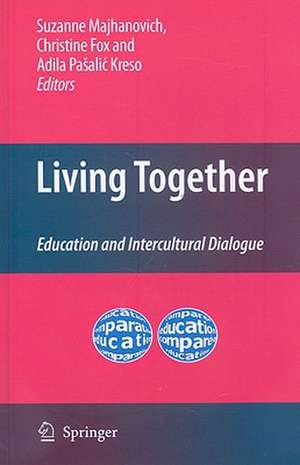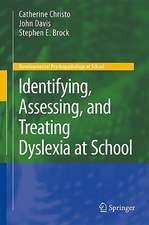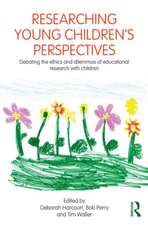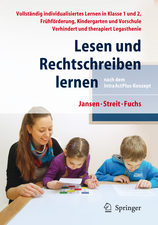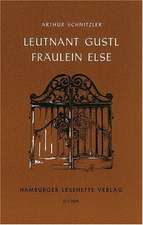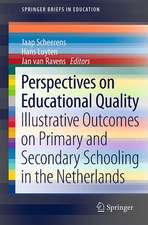Living Together: Education and Intercultural Dialogue
Editat de Suzanne Majhanovich, Christine Fox, Adila Pasalic Kresoen Limba Engleză Hardback – 2 mar 2009
| Toate formatele și edițiile | Preț | Express |
|---|---|---|
| Paperback (1) | 637.46 lei 6-8 săpt. | |
| SPRINGER NETHERLANDS – 19 oct 2010 | 637.46 lei 6-8 săpt. | |
| Hardback (1) | 643.34 lei 6-8 săpt. | |
| SPRINGER NETHERLANDS – 2 mar 2009 | 643.34 lei 6-8 săpt. |
Preț: 643.34 lei
Preț vechi: 756.86 lei
-15% Nou
Puncte Express: 965
Preț estimativ în valută:
123.12€ • 127.19$ • 102.47£
123.12€ • 127.19$ • 102.47£
Carte tipărită la comandă
Livrare economică 26 martie-09 aprilie
Preluare comenzi: 021 569.72.76
Specificații
ISBN-13: 9781402098154
ISBN-10: 1402098154
Pagini: 236
Ilustrații: VI, 230 p.
Dimensiuni: 155 x 235 x 18 mm
Greutate: 0.5 kg
Ediția:2009
Editura: SPRINGER NETHERLANDS
Colecția Springer
Locul publicării:Dordrecht, Netherlands
ISBN-10: 1402098154
Pagini: 236
Ilustrații: VI, 230 p.
Dimensiuni: 155 x 235 x 18 mm
Greutate: 0.5 kg
Ediția:2009
Editura: SPRINGER NETHERLANDS
Colecția Springer
Locul publicării:Dordrecht, Netherlands
Public țintă
ResearchCuprins
The WCCES and Intercultural Dialogue: Historical Perspectives and Continuing Challenges.- Bridging Cultures and Traditions for Educational and International Development: Comparative Research, Dialogue and Difference.- Complex Societies, Common Schools and Curriculum: Separate is not Equal.- The War and Post-War Impact on the Educational System of Bosnia and Herzegovina.- Engaging Youth in Community Development: Post-War Healing and Recovery in Bosnia and Herzegovina.- Le « Harcèlement Entre Pairs » À L’École Élémentaire Tchèque: Une Question D’interprétation.- Core Elements of the European (Higher) Education Policy: Market-Driven Restructuring or Impetus for Intercultural Rapprochement?.- Teacher Education and Development Policies: Critical Discourse Analysis from a Comparative Perspective.- Towards an Indigenous African Educational Discourse: a Philosophical Reflection.- Nurturing Relationships and Honouring Responsibilities: A Pacific Perspective.- Convergence of Monastic and Modern Education in Bhutan?.- Frontiers of Education: Japan As “Global Model” or “Nation At Risk”?.
Textul de pe ultima copertă
The papers in this book provide international perspectives on the possibilities for and challenges facing intercultural dialogue in education. These challenges are many in a world characterized by the tensions and demands of both global and local issues as well as regional conflicts. This is especially so as post-conflict deliberations are complicated by the cultural, religious and linguistic diversity within both small and large states. The authors here analyze the interplay between intercultural dialogue, education and the state, and reveal how educational experiences are able either to exacerbate problems, or mitigate them by promoting an intercultural dialogue of reconciliation as well as recognition of shared values. The mere act of collaborating in educational endeavor can itself have a positive impact.
The outcomes of attempts at intercultural understanding are examined by educational researchers from high- and low-income countries, from the east and the west, and from both northern and southern hemispheres. The authors demonstrate the value of disciplined comparison of differing education societies, and detail the international research aimed at augmenting cross- and intercultural understanding.
This exciting and wide-ranging volume has been facilitated by the World Council of Comparative Education Societies and affords compelling visions of the ways in which education can be a force for good in our highly diverse societies by fostering intercultural dialogue.
The outcomes of attempts at intercultural understanding are examined by educational researchers from high- and low-income countries, from the east and the west, and from both northern and southern hemispheres. The authors demonstrate the value of disciplined comparison of differing education societies, and detail the international research aimed at augmenting cross- and intercultural understanding.
This exciting and wide-ranging volume has been facilitated by the World Council of Comparative Education Societies and affords compelling visions of the ways in which education can be a force for good in our highly diverse societies by fostering intercultural dialogue.
